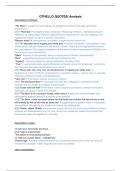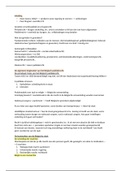Lecture notes
A Level English Literature Othello quotes + analysis
- Module
- A level English
- Institution
- A Level English
This document contains a list of quotes from the Shakespearean tragedy of "Othello" included in the syllabus of the Edexcel A Level English Literature exam. The quotes are divided under certain themes/characters and after each quote there is an easy-to-learn summarised and brief analysis of the quo...
[Show more]




